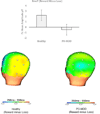Neural Correlates of Reward Processing in Depressed and Healthy Preschool-Age Children
- PMID: 27871643
- PMCID: PMC5131532
- DOI: 10.1016/j.jaac.2016.09.503
Neural Correlates of Reward Processing in Depressed and Healthy Preschool-Age Children
Abstract
Objective: Adults and adolescents with major depressive disorder (MDD) show a blunted neural response to rewards. Depression has been validated in children as young as age 3; however, it remains unclear whether blunted response to reward is also a core feature of preschool-onset depression. If so, this would provide further validation for the continuity of the neural correlates of depression across the life span and would identify a potential target for treatment in young children.
Method: Fifty-three 4- to 7-year-old children with depression and 25 psychiatrically healthy 4- to 7-year-old children completed a simple guessing task in which points could be won or lost on each trial while event-related potentials (ERPs) were recorded. Psychiatric diagnosis was established using a preschool version of the Kiddie Schedule for Affective Disorders and Depression.
Results: Young children with depression showed a reduced differentiation between response to gains and losses, and this finding was driven by a blunted response to reward (i.e., the reward positivity [RewP]). These findings held even when controlling for co-occurring attention-deficit/hyperactivity disorder, oppositional defiant disorder, and generalized anxiety disorder. The RewP did not vary as a function of depression severity within the group with depression.
Conclusion: Similar to adults and adolescents with depression, preschoolers with depression display reductions in responsivity to rewards as indexed by the RewP. These findings provide further evidence for continuity in the neural mechanisms associated with depression across the lifespan, and point to altered reward sensitivity as an early-emerging potential target for intervention in preschool-onset depression. Clinical trial registration information-A Randomized Controlled Trial of PCIT-ED for Preschool Depression; http://clinicaltrials.gov/; NCT02076425.
Keywords: ERP; RewP; preschool depression; reward.
Copyright © 2016 American Academy of Child and Adolescent Psychiatry. Published by Elsevier Inc. All rights reserved.
Conflict of interest statement
Irvin, Kelly, and Karlow report no biomedical financial interests or potential conflicts of interest.
Figures




References
-
- Robins LN, Regier D. Psychiatric disorders in america: The Epidemiologic Catchment Area Study. New York: Free Press; 1991. pp. 328–366.
-
- Donohue JM, Pincus HA. Reducing the societal burden of depression: a review of economic costs, quality of care and effects of treatment. Pharmacoeconomics. 2007;25(1):7–24. - PubMed
-
- Luby J. Depression in preschool-age children: current evidence. The Brown University Child and Adolescent Behavior Letter. 2007;23(1–6)
-
- Luby J, Belden A. Defining and validating bipolar disorder in the preschool period. Development and psychopathology. 2006;18(4):971–988. - PubMed
Publication types
MeSH terms
Associated data
Grants and funding
LinkOut - more resources
Full Text Sources
Other Literature Sources
Medical

